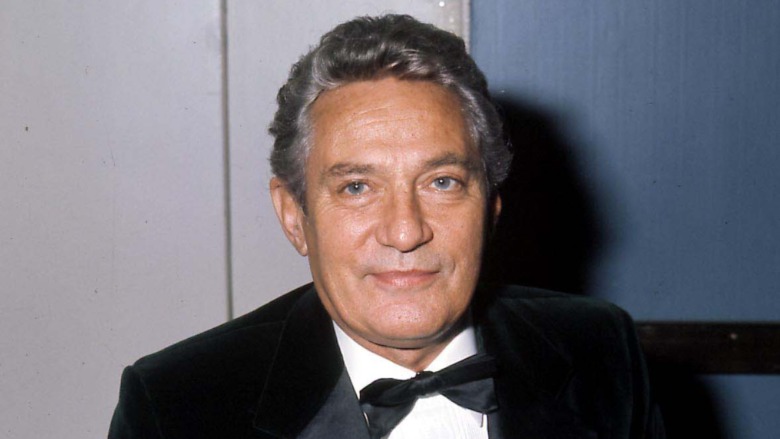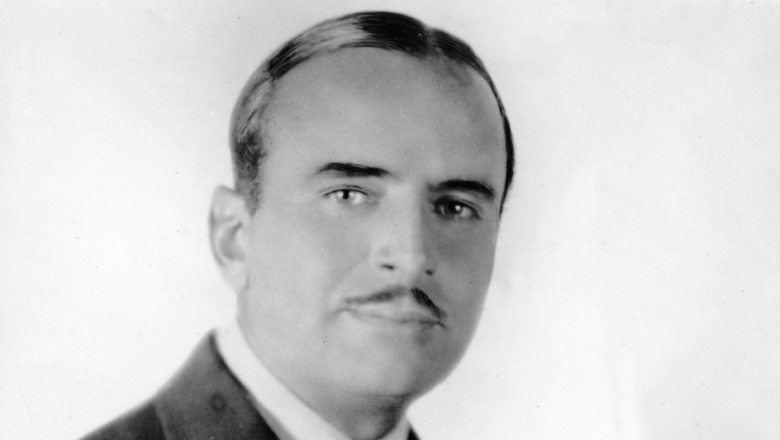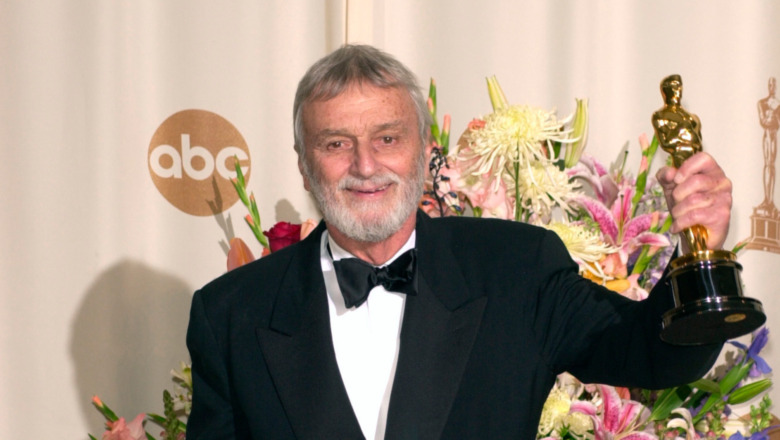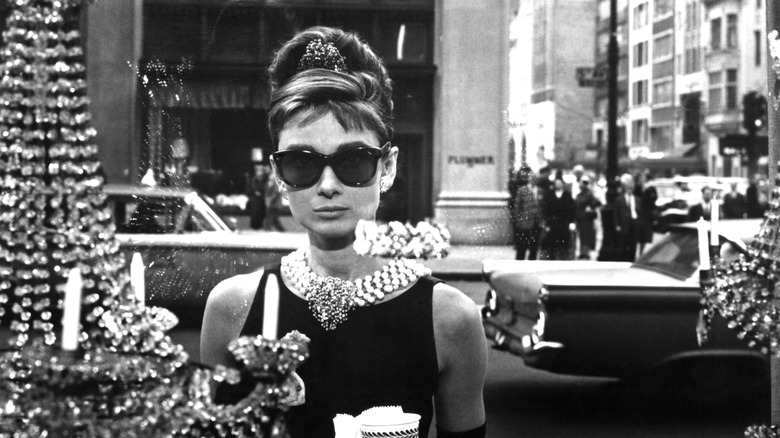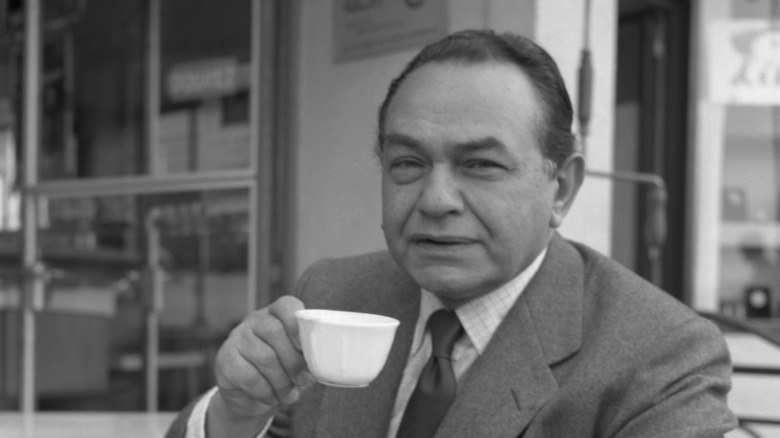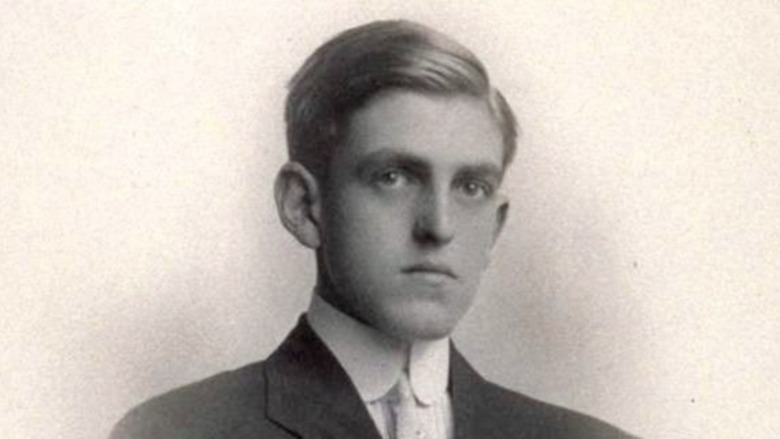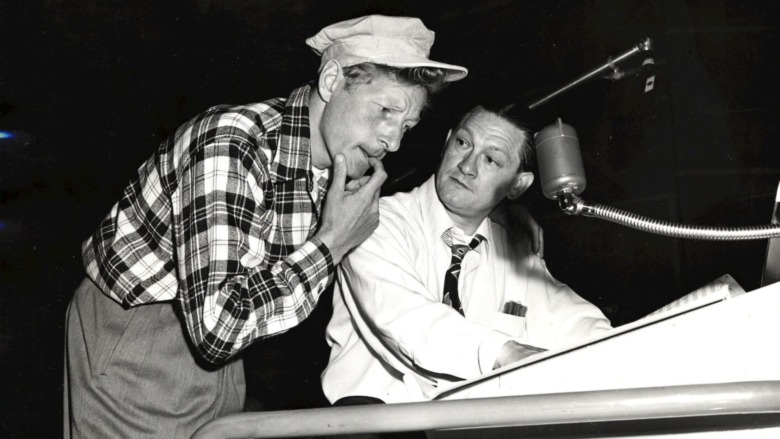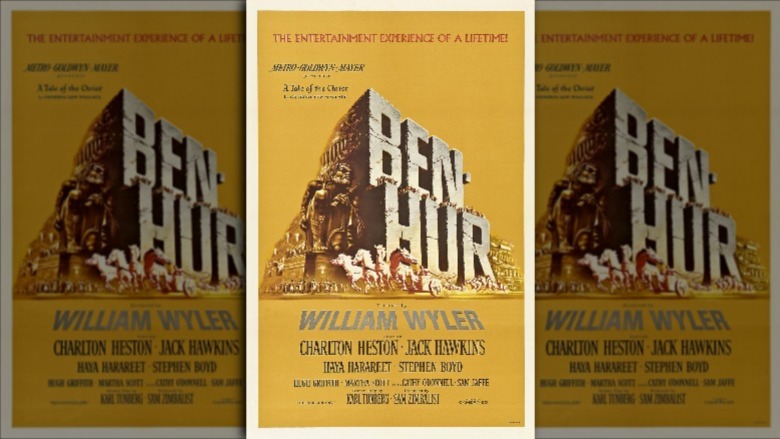People Who Died The Same Year They Won An Oscar
The Academy Awards, otherwise known as the Oscars, is an American entertainment awards ceremony that takes place every spring. In fact, the Academy Awards are the first of their kind, beginning in 1929 as a 15-minute ceremony accompanied by a dinner for the who's who of the entertainment industry. Because of its long history and worldwide acclaim, owning an Academy Award puts you in the same league as some of the greatest stars Hollywood has ever seen, from Audrey Hepburn to Tom Hanks.
Sadly, another exclusive awards club of sorts has sprung up over the years — people who died the same year they won an Oscar. Sometimes, deaths occur right before awards season, prompting a handful of posthumous Oscar nominations and awards throughout the years. Many of these talents did not learn of their nominations before they died. A smaller few got to see the ceremony but died shortly after receiving their awards. In celebration of the life of these great talents, here are stars who died the same year they received their Academy Awards.
Peter Finch
Actor Peter Finch was born in London and raised in Sydney. He began his acting career on the stage, but after suffering from crippling stage fright, he transitioned to the big screen. It was here that he found fame, and over the course of his career, he was nominated for seven BAFTAs, two Golden Globes, and two Academy Awards (per IMDb).
Sadly, Finch died of a heart attack in 1977 while on a press tour for his recently wrapped TV movie, "Raid on Entebbe," according to The Washington Post. He had appeared on "The Tonight Show Starring Johnny Carson" the night before and even reportedly made a cryptic joke about dying from a heart attack. He was 60 years old.
He would soon be nominated for Best Actor for his role in "Network," which he won. His wife accepted the award in his place, and she shared a message he had given her before his death: "Before he died he said to me, 'Darling, if I win, I want to say thanks to my fellow actors who have given me encouragement over the years.'" He was the first actor to win a posthumous Oscar (though Jeanne Eagles was the first to be posthumously nominated in 1930). Finch is interred at Hollywood Forever Cemetery.
Heath Ledger
Australian actor Heath Ledger's career was impressive, despite being cut short by his untimely death at age 28. His most famous role was his last, namely his portrayal of the Joker in the "Batman" revival "The Dark Knight." Ledger famously had a grueling month preparing for the role, during which he locked himself in a London hotel room and attempted to get in the mindset of a psychopath. His portrayal of the Joker is widely regarded as the best in DC Comics history due to the dimensions he brought to the character.
Several months before the film premiered, the young actor was found dead of a prescription drug overdose in his apartment in 2008. The tragic event was deemed an accident. He left behind his ex-fiancée, actress Michelle Williams, and their three-year-old daughter Mathilda.
"The Dark Knight" was a box office hit, and it did well the following awards season. A year after his death, Ledger was even nominated for Best Supporting Actor for his role, a category which he went on to win. This made him the second person in an acting category to ever receive a posthumous Oscar, according to Reuters. Ledger's father, mother, and sister accepted the award on his behalf. The statue will go to his daughter once she turns 18.
Douglas Fairbanks
Douglas Fairbanks was an influential movie star during the silent film era, starring in 29 films, including "Robin Hood" and "The Mark of Zorro." He went on to found the production company United Artists with his wife, fellow actress Mary Pickford, and friend Charlie Chaplin in 1919. Over the years, United Artists was responsible for many popular films, including "West Side Story," "Rocky," and "Rain Man." The studio provided more autonomy for actors, who could take work based on their own best interests rather than being beholden to larger studios' whims.
Fairbanks was around for many ceremonial firsts in the film industry. For starters, he and his wife were the first to put their handprints in wet cement outside of the Chinese Theater, creating a tradition still in place today, per the Associated Press. Fairbanks also hosted the first-ever Academy Awards, an honor owed to him as the first-ever president of the Academy. The ceremony began as a dinner party with just 250 guests. Movies with sound — the first of which came out two years previously — were not allowed during the ceremony, as the Academy decided it would be "unfair."
Needless to say, Fairbanks' mark on Hollywood's early years was indelible. When he died of a heart attack in 1939, he received an honorary commemorative award the following season for his contributions to the international development of cinema. According to Oscars.org, he and Sydney Howard were the first two people to receive posthumous Academy Awards, both at the 12th annual ceremony.
Malik Bendjelloul
Swedish documentary filmmaker Malik Bendjelloul won the Oscar for Best Documentary for his work "Searching for Sugar Man" in 2013. The film is about a singer from Detroit who, unbeknownst to him, became extremely successful in South Africa as an anti-apartheid symbol. Everything seemed well and good at the ceremony, with the filmmaker delivering a brief but excited acceptance speech before walking offstage.
About a year later, he shocked friends and family by jumping in front of a moving train, killing himself. He was 36 years old and on track for a lucrative Hollywood career. At the time of his death, The Guardian reported that he was basically a celebrity in Sweden, had multiple high-paying offers for directing films in Hollywood, and had even begun working on a new project. Friends and family said he had no known history of mental illness and mourned the loss of the "lovely human being" that was Bendjelloul.
If you or anyone you know is having suicidal thoughts, please call the National Suicide Prevention Lifeline at 1-800-273-TALK (8255).
Conrad L. Hall
Conrad L. Hall was a cinematographer born in French Polynesia. He was named for screenwriters Joseph Conrad and Lafcadio Hearn and was seemingly destined for greatness behind the scenes. Initially attending USC to study journalism, he switched to the pursuit of film and made documentaries, TV shows, and feature films throughout his successful career. His most notable works include "Butch Cassidy and the Sundance Kid," "In Cold Blood," and "American Beauty." For his achievements, he even earned a star on the Hollywood Walk of Fame.
Conrad Hall was no stranger to the Academy Awards, as he was nominated for 10 throughout his life and won three. Sadly, Hall died of bladder cancer at the age of 76, as reported by The Edwardsville Intelligencer, before he could receive his last award. Several months later, he won Best Cinematography for his work on "Road to Perdition." Hall's son accepted the award on his behalf, saying, "God gives each and every one of us the gift of life, and what we do with that life is our gift back to him. I cannot think of a better gift than my father." Hall also gained his star on the Hollywood Walk of Fame posthumously in a ceremony four months after his death.
Audrey Hepburn
Audrey Hepburn had an incredible career in entertainment. Though she appeared at least 34 TV specials and feature films, the 16 films she starred in during the 1950s and '60s make up the most iconic part of her career. It was through these films, such as "Breakfast at Tiffany's," "My Fair Lady," and "Roman Holiday," that Hepburn's stunning good looks, beautiful voice, and impeccable style came to be so well-known. Throughout her life, she was nominated for 41 major awards, of which she received 25, per IMDb.
But her achievements don't stop at the silver screen. Hepburn was voted onto the International Best Dressed List in 1961, solidifying her place as an eternal fashion icon. Much of her fashion came out of a partnership with Hubert de Givenchy, who updated classic silhouettes to make impeccably well-fit garments. Givenchy, who became a lifelong friend of Hepburn's, said, "She gave a life to the clothes." Outside of her pop cultural importance, Hepburn also became a UNICEF ambassador in 1989. She toured cites around the world, testified before Congress on behalf of global children in crisis, and drove fundraising efforts for the organization.
Sadly, the Hollywood icon died of colon cancer in 1993, according to History. Soon after, she received the Jean Hersholt Humanitarian Award, an honorary Academy Award. Hepburn died eight days after the Academy voted to confer this award, two months before the 65th ceremony. Gregory Peck introduced the award, saying, "If someone ever lived up to the ideals of this award, the dedication and conviction, it was Audrey Hepburn."
Edward G. Robinson
Edward G. Robinson is regarded as one of the greatest men in American cinematic history. During his long career, Robinson appeared in more than 100 films and was known for his "tough guy" roles in talkies like "Little Caesar." Offscreen, Robinson was known for his anti-facist efforts during World War II, donating to organizations which provided war relief and publicly criticizing Nazism. This did not, however, prevent him from getting swept up in the Red Scare, and he was forced to testify in front of Congress that he was not Communist-affiliated.
In 1973, Robinson died of bladder cancer in a Los Angeles hospital. There was a service at Temple Israel in L.A. before his body was flown back to Brooklyn, where he is entombed. Among his pallbearers were notable figures like Frank Sinatra and Jack L. Warner of Warner Brothers, according to The New York Times.
Because of his lifetime of achievements, the Academy voted to give Robinson an honorary Oscar in 1973. Robinson died after the Academy voted to confer this award but before the actual ceremony. His wife, who accepted the award on behalf, read the speech he had been preparing for the moment: "[This award] could not have come at a better time in a man's life."
Sidney Howard
Sidney Howard was a writer from California who went on to have a successful career in entertainment. He began his career as a playwright in New York, writing both smash hits and flops, and is credited by Britannica for bringing "psychological as well as theatrical realism to the American stage." Despite being a known Communist during a politically conservative era, Howard became a Hollywood mainstay and enjoyed a job at MGM Studios.
To escape his busy life, Howard bought a farm in Tyringham, Massachusetts. He had a passion for nature and loved hunting and fishing as much as tending to gardens and orchards. Sadly, he was accidentally crushed to death by a two-and-a-half ton tractor at his farm in 1939.
Howard won a posthumous Oscar in 1940 for his screenplay, "Gone with the Wind," six months later. Though he had won the Pulitzer Prize for Drama during his lifetime and had been nominated for two Oscars, he never lived to see an Academy Award win.
Victor Young
Victor Young was a composer and accomplished violinist from Chicago. After studying music in Europe and performing across the continent, he returned to America and found fame as an arranger and songwriter. There, he worked with Judy Garland and Bing Crosby, in addition to signing with Paramount pictures and becoming one of Hollywood's lead composers. In fact, according to the Songwriters Hall of Fame, he wrote a whopping 350 scores over the course of his career. Notable films featuring Young's music include "The Wizard of Oz," "For Whom the Bell Tolls," and "Around the World in Eighty Days."
Despite being nominated for 22 Oscars, Young's only win came after his death. (According to Entertainment Weekly, he actually holds the record for most Academy Award nominations before securing a win.) He died of a cerebral hemorrhage at the age of 57 in Palm Springs. Young was nominated for the award posthumously. Today, he lies in Hollywood Forever Cemetery in a room with a large piano, reserved for many of the great musicians of his time.
Thomas C. Goodwin
Thomas C. Goodwin was a filmmaker and activist based in Washington, D.C. Together with his career partner Gerardine Wurzburg (sometimes spelled "Geraldine"), he co-founded a production company called State of the Art Inc. He and Wurzburg produced over 50 films during their time together, mostly focusing on issues of health and education. Goodwin's life path before film had not been straightforward: He worked on a charter yacht and attended law school before finding his true passion in making documentaries. According to The Washington Post, a few of his films even involved such greats as Jimi Hendrix and Andy Warhol.
His final film, "Educating Peter," follows a third grader with Downs syndrome as he starts school for the first time. Goodwin died of prostate cancer in December 1992 at 51 years old, just three months before the next Academy Awards ceremony. He posthumously received the Oscar for Best Documentary (Short Subject) along with his co-producer, Wurzburg. Wurzburg accepted the Oscar by herself, dedicating it to Goodwin and his wife.
William A. Horning
William A. Horning was an art director on such films as "The Wizard of Oz," "North by Northwest," and "Ben-Hur." He began his career in 1931 as a draftsman, which is a person who interprets loose sketches of a set design from higher-ups and from them creates a technical drawing. From there, he progressed through the ranks, first as an assistant and finally as an art director. He would go on to be credited in nearly 60 films over the course of his illustrious career.
Sadly, Horning died in 1959 at the age of 54. According to his obituary published in Variety, his death was due to a "long illness." Both he and producer Sam Zimbalist died during the production of Ben-Hur, for which they both received posthumous awards.
With eight Oscar nominations total, Horning is the only person to win posthumous Academy Awards in two consecutive ceremonies and has the most posthumous awards of anyone. He won his first for "Gigi" within a month of his death and his second for "Ben-Hur" the following awards season.
Howard Ashman
Howard Ashman was responsible for many well-known original songs in movies and musicals, such as those featured in "Aladdin," "Little Shop of Horrors," and "The Little Mermaid." Ashman began his career as a playwright and eventually started collaborating on musicals with other creators. His work on "Little Shop of Horrors" brought him attention and recognition — including his first Academy Award nomination — and he soon signed to Disney as a lyricist. Ashman was a strong presence in the "Disney Renaissance," casting actors and advocating for certain animation styles in addition to penning original songs.
Ashman found out he was HIV-positive halfway through the making of "The Little Mermaid," a film for which he wrote every song along with composer Alan Menken. By the time "Beauty and the Beast" was in production, Ashman had become so weak that animators had to work from his home in upstate New York. According to The New York Times, in March 1991, he died at 40 years old due to AIDS-related complications, almost exactly a year before the 1992 Academy Awards. In that year's awards, he was nominated for three original songs and received one win.
Ashman's legacy lives on through his many original songs, which are beloved by children and adults alike. Additionally, a documentary honoring Ashman, titled "Howard," began streaming on Disney+ in 2020.

